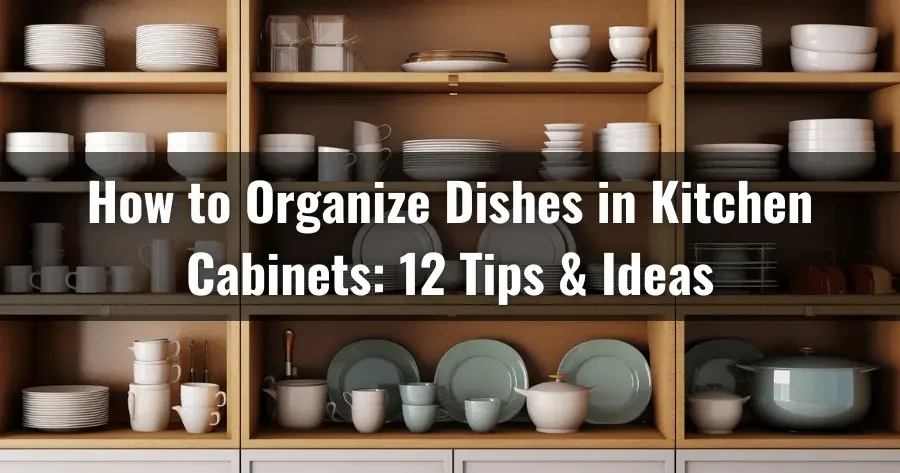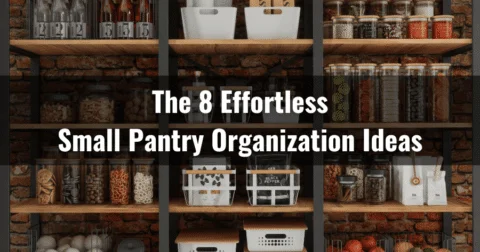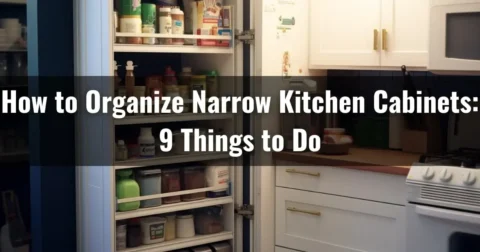Organizing dishes in kitchen cabinets is not just about tidiness. It makes our kitchens more functional and improves our daily cooking and dining experiences.
A well-organized cabinet system can save you time, reduce clutter, and make accessing the items you need easier. So, knowing how to organize dishes in kitchen cabinets is essential for maximum efficiency and style.
To organize dishes in kitchen cabinets effectively, start by decluttering and removing items you no longer use. Group similar items together, like baking dishes and dinner plates, for easy access. Utilize drawer dividers for utensils to keep them neat and organized, and ensure frequently used items are within easy reach.
Here, we will explain how to organize your dishes practically and efficiently in your kitchen cabinet and what you can gain from it.
How to Organize Dishes in Kitchen Cabinets: 12 Easy Tips
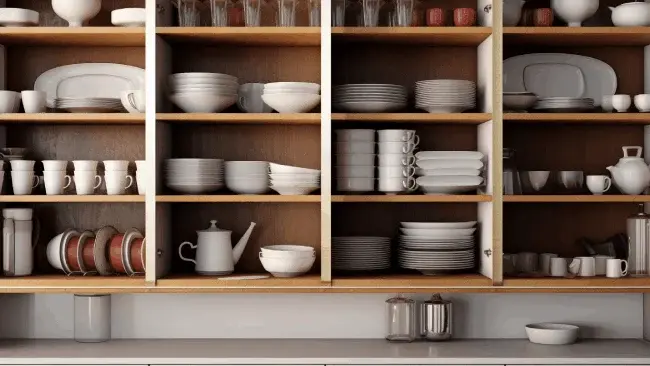
When organizing dishes in your kitchen cabinet, you should consider factors such as the size and weight of the items, accessibility, label placement, etc. Here are the ultimate tips to help you declutter and organize your dishes.
Let’s go over each tip on organizing dishes in kitchen cabinets in more detail.
Tips 01. Declutter and Sort by Function
Start by decluttering and sorting your dishes by function, grouping together everyday items like plates, bowls, and glasses. Remove any chipped or broken items and those that are no longer needed.
Tips 02. Prioritize Accessibility
Make sure to place frequently used dishes and utensils at waist or eye level so they are easily accessible. We recommend to arrange plates, bowls, and glasses within arm’s reach for convenience.
Reserve higher shelves for less frequently used items, such as special occasion serving platters or fine china. Store heavier or bulkier items on lower shelves to avoid straining yourself when reaching for them. Prioritizing accessibility in your kitchen cabinets will make your daily tasks more efficient and enjoyable.
Tips 03. Utilize Drawer Dividers for Utensils
Utilize drawer dividers to keep your utensils organized and easily accessible. These dividers are specifically designed to create separate compartments for your cutlery and cooking tools. It allows you to maintain order in your kitchen drawers.
Adjustable dividers are a great option as they allow you to customize the layout based on the sizes of your utensils. With these dividers, you can say goodbye to digging through a jumbled mess of utensils and finding what you need quickly and effortlessly.
Tips 04. Invest in Plate Holders
To keep your plates secure and easily accessible, kitchen experts often suggest investing in plate holders that fit the size and weight of your plates. These holders are specifically designed to keep your plates from wobbling or slipping when stacked vertically.
Tips 05. Cup and Glass Storage
Storing cups and glasses upside down prevents dust and debris from getting inside. This simple trick ensures that your drinkware stays clean and always ready to use.
If you have limited shelf space in your kitchen cabinets, consider installing hooks or racks underneath to hang your glassware.
This vertical storage method allows you to maximize your cabinet space while keeping your cups and glasses easily accessible. Just be sure to adequately space the hooks or racks to prevent overcrowding and potential breakage.
Tips 06. Efficient Pot and Pan Storage
Nesting pots and pans with their lids can save space and keep your kitchen organized. Stack them neatly to maximize storage.
If you have nonstick pans, place pan protectors or towels between them to prevent scratches. Utilize pan organizers or pull-out shelves in deep cabinets for better accessibility.
Tips 07. Cabinet Organizers for Maximizing Space
When installing cabinet organizers, measuring the cabinets’ dimensions is advisable to ensure a snug fit and maximize space. Take precise measurements before purchasing organizers like pull-out or roll-out shelves. Once installed, arrange your dishes on these organizers based on frequency of use.
Tips 08. Label or Categorize Shelves
Labeling or categorizing shelves can help you easily locate and identify items in your pantry or storage area.
When organizing dishes in kitchen cabinets, consider grouping them based on their use, such as everyday plates, special occasion dinnerware, or baking dishes.
Use adhesive labels or a label maker to mark each shelf’s contents clearly.
Tips 09. Stack Plastic Containers in Clear Boxes
To keep your plastic containers organized, we recommend stacking them in clear containers of different sizes for easy access and visibility. This way, you can easily see which containers are inside without digging through a messy pile.
The varying sizes will allow you to accommodate different portion sizes and shapes. You’ll never have to worry about mismatched lids again.
Tips 10. Drawer Dividers for Cutlery
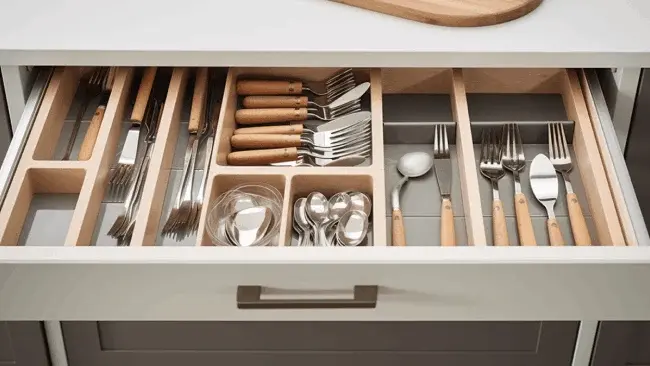
Drawer dividers are indispensable for keeping your knives, forks, spoons, and other utensils in order. With various configurations available, you can create designated compartments for each type of utensil. This customizable layout ensures everything has its place and makes finding what you need a breeze.
Tips 11. Spice and Small Item Organization
Spice racks, drawer inserts, or small baskets can help organize your spices, condiments, and small kitchen items. Place spice racks on a wall or inside a cabinet for easy access.
Use drawer inserts to separate and organize different types of spices and condiments. Small baskets can store small kitchen items like measuring spoons or bottle openers.
Tips 12. Customize to Your Needs and Kitchen Layout
Analyze your daily cooking routines and habits to determine the most convenient locations for storing specific items.
Place baking sheets and pans near the oven or cooking utensils near the stove. Continuously assess your organization system and adjust it to ensure it is tailored to your evolving needs.
Frequently Asked Questions
During our research phase, we often get questions about organizing a kitchen. Here are some answers to the most common ones.
1. What are the cabinets called that hold dishes?
Cabinets that hold dishes are commonly known as hutches or sideboards. These pieces of furniture have been used for centuries as a means of organizing and displaying dishware.
A hutch typically includes open shelving for displaying dishes and closed cabinets or drawers for additional storage. In contrast, sideboards are often longer and lower in height and include cabinets, drawers, or open shelving. These cabinets are typically wood and may feature intricate detailing or decorative accents.
Aside from their functional use in organizing dishware, hutches and sideboards can also serve as beautiful and stylish additions to the dining or kitchen room.
2. How do you organize mixing bowls in cabinets?
When organizing mixing bowls in cabinets, we advise nesting them together for efficient storage.
Start by placing the largest bowl at the bottom of the stack and then fit smaller bowls inside. This not only saves space but also keeps your bowls from toppling over.
If you have lids for your bowls, store them separately in a designated container or drawer to keep everything organized and easily accessible.
3. How do you display dishes in a cabinet?
To use the entire space, it is recommended to consider layering your dishes. Utilize the vertical space by leaning plates upright against the back of the cabinet. This not only showcases your beautiful patterns but also saves valuable space.
Also, avoid stacking your plates too high, as the stack can become unstable. Arrange platters and other larger dishes on the bottom shelf of the cabinet to help anchor everything in place.
4. How can I organize my collection of cookbooks within my kitchen cabinets?
If you want to maximize the space in your cabinet and keep your cookbooks organized, we suggest using bookends or magazine holders. This will prevent them from getting lost or damaged, among other items.
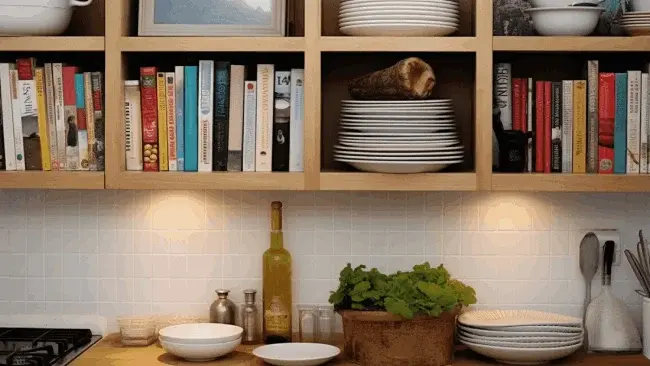
You can also install a pull-out shelf to make accessing your collection easier. Arrange the books by size or category for a neat and efficient display.
This way, you’ll always have your go-to recipes within reach while keeping your kitchen cabinets clutter-free.
Conclusion
Now you know how to organize dishes in kitchen cabinets for a better appearance. By organizing your dishes in the kitchen cabinets, you can create a harmonious and efficient space that is both aesthetically pleasing and functional.
Just like arranging puzzle pieces to form a beautiful picture, each dish finds its rightful place, creating a symphony of order and ease.
Using the tips we covered in this article, you can transform your cabinets into a masterpiece of organization. So go ahead, embark on this journey of culinary tidiness, and enjoy the satisfaction of an organized kitchen.


